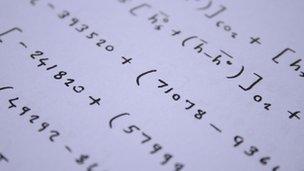A-level sciences 'lack the maths students need'
- Published

A framework to boost maths in A-level sciences is needed, say the report authors
A-level science exams do not contain enough maths questions to prepare students to progress to science degrees or related jobs, says a report.
The authors claim that even those that are asked are often too easy.
The report by a group of leading science organisations calls for a new framework to regulate the way maths is assessed within science A-levels.
The government says it wants universities to be more involved in the design and development of A-levels.
The report by Score (Science community representing education) analysed the type, extent and difficulty of the mathematics in the 2010 A-level papers for biology, chemistry and physics.
'Worrying'
The authors said the exams failed to assess the full range of maths skills needed for the subjects.
They added that the exams often also failed to meet the requirements for A-level science qualifications set out by the exams regulator Ofqual.
Professor Graham Hutchings, chairman of Score, said: "Our findings are worrying. A significant proportion of the mathematical requirements put in place by the examinations regulator, Ofqual, for each of the sciences were simply not assessed and, if they were, it was often in a very limited way."
The report also claimed that the Ofqual requirements were themselves inadequate in that they left out areas of mathematics which underpinned the sciences.
For example the requirements for physics and chemistry A-level left out calculus and the requirements for biology A-level ignored the maths needed to convert between different units.
The authors also found a disparity between the different exam boards, with some requiring a greater proportion of maths and more complex calculations than others.
They called for a framework to ensure parity between boards, and a review of the mathematical requirements for each of the sciences at A-level.
Prof Hutchings said professional scientific bodies should play a role in the design of A-levels to ensure they were fit for purpose.
A-level change
A second report into the maths content of six other A-level subjects which depended on maths found even greater variation in mathematical content between boards.
The Nuffield Foundation examined the 2010 A-level papers for business studies, computing, economics, geography, psychology and sociology.
The report concluded that with the exception of computing, the variation in mathematical content was so great that the qualifications did not give universities or employers a meaningful indication of students' level of mathematical skill or understanding.
The two reports were carried out in response to research last year that suggested two-thirds of science undergraduates did not have the necessary mathematical skills for their course.
A spokesman for Ofqual responded: "We intend to consult in the summer on proposals to change the A-level system. When A-levels are redesigned, universities and other learned bodies will be more involved in deciding the content to make sure they meet their needs.
"Our own research into universities', employers' and teachers' views of A-levels also highlighted some concerns about the mathematical content of A-levels, particularly physics."
Cambridge Assessment, which owns the exam board OCR, said the research confirmed its own work on higher education, and added that it was already working on new qualifications to boost the mathematics skills of A-level science students.
A spokeswoman for the Edexcel exam board said: "We should take on board the expertise of employers whose views are important for building high-quality examinations that meet the demands of the global economy."
- Published8 August 2011
- Published14 June 2011